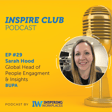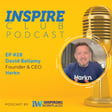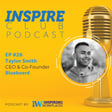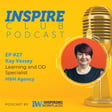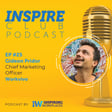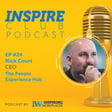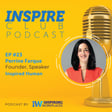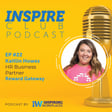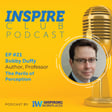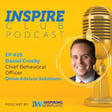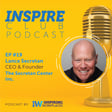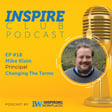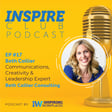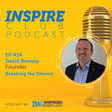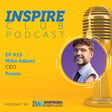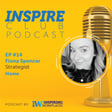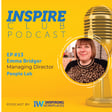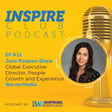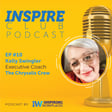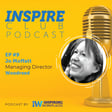Introduction of Jason Anthony
00:00:00
Speaker
Hello and welcome to the latest episode of Inspire Club. This week we're going to get straight into our guest and our conversation and basically what can I say, this man's passionate about comms and is damn good at them too.
00:00:16
Speaker
In his own words, he does one thing to help companies inform, involve and inspire. We like that word, inspire their employees. OK, as he says, that's probably three things. But like so many of our guests that I have the honor to speak to, I've admired this person for a very long time, and I will get to know him along with you on this podcast.
Role of Internal Comms and HR
00:00:42
Speaker
So please welcome the founder of Audacity, Jason Anthony.
00:00:46
Speaker
How are you doing? Hello, hello. I'm doing great. What about you, Matt? Yeah, good. Just a crazy world, isn't it? It's just a crazy, crazy world out there. It has been for a long time and rolling with the punches, as they say.
00:01:01
Speaker
Yeah, exactly. You know, I think a lot of internal comms folks and HR folks and people who are responsible for those types of things and organizations were doing a great job long before the pandemic came along. And then now that that's here, wow, what superstars they've been just responding and doing a lot of heavy lifting that they themselves didn't know that they were capable of. But you know, they're doing a great job kind of holding things together for everybody. And despite all the
00:01:29
Speaker
pandemic stuff, what a great opportunity for them to really shine and help lead their organizations.
00:01:36
Speaker
I could not have said it better myself, and I won't even try to top that. So here's everything you've just said. And whilst doing everything they have to do at home as well. Yeah, on top of that, they take care of the company as well as their family, their dog, their relatives, whatever needs doing, they're going to do it. Yeah. And at some point, look after yourself, please, you know, put yourself first because the strain you've been under has been incredible.
00:02:05
Speaker
We hope that this is a little bit of light relief for you, but our community-inspired workplace is also somewhere that you can knock ideas about and get things off your chest. But to you, Jason, that you're already coming across as I thought you would be, thinking of others. It's fantastic.
00:02:23
Speaker
But spotlight back on you. And you can now talk about somebody else as well, though, as our first question and only rule of Inspire Club is sharing a story of somebody at work who's inspired you along the way.
Influence of CEO Dick Jackson
00:02:39
Speaker
Well, you know, I've been doing this for 32 years and even though I don't look like it, I'm quite younger than I actually am. But the reality is 32 years of doing this, you're going to run into a lot of people.
00:02:55
Speaker
And all of them, you remember, some for good reasons and some for not good reasons. But they all have this knack of inspiring you in different ways. And so when I think of someone who's inspired me positively, I think of a couple of CEOs that I've worked with. My very first job out of university was doing the employee newsletter at a bank.
00:03:22
Speaker
And we had a CEO who was a former U.S. Marine. And, you know, you can't imagine a more, you know, male aggressive type A personality. But he was the most humble and empathetic leader that I've ever worked with.
00:03:41
Speaker
He was my very first CEO so i started off on the right foot and everyone else after him i've kind of compared him to but you know he just really understood employees what they do how they do it.
00:03:56
Speaker
why what they do really matters not just to the bank but to them personally. It's just very approachable and friendly and was the type of leader who despite being in the Marines and they want to take the hill first,
00:04:12
Speaker
He was always behind pushing people and helping them and coaching them. So it wasn't all about him. It was all about how he could help others be successful. And that was just a fantastic lesson to learn right out of university. And he continues to inspire me to this day.
00:04:30
Speaker
Are we able to share the name of this great man? Yes, his name is Dick Jackson and the bank that we worked for was Georgia Federal Bank here in Atlanta, Georgia. We eventually got bought and that company got bought and then that company got bought as happens often here in the states, particularly in the financial services industry. He's been retired now for several years.
00:04:58
Speaker
You know, it's just like a little ripple on a pine. Those ripples of working with him and how he was as a leader continue to inspire, not just me, but the rest of the people that were on our comms and marketing team. Well, thank you very much to Dick Jackson. And if you're sitting in contact with him, please forward this podcast on to him so he can hear what he meant to you. Because I think it's very, very powerful knowing the impact you've made on people. It's amazing that
00:05:27
Speaker
We've done 11 of these new reformatted podcasts now and it's usually somebody early in your career that people really remember and there must be some psychology in that. I think so. I think, you know, those are the formative years and you're learning and you're a little bit nervous and scared and somebody who kind of takes you under their wing.
00:05:47
Speaker
And it kind of gives you the tough love you need to get on the right path, to have a great career. I think those people are memorable, whether they're early or late, but they're typically early because you're so young and impressionable. You're just soaking all that stuff up. What a great story as well for Don't Judge a Book By Its Cover. As you said,
00:06:08
Speaker
but ex-Marine, not what you would think, humble and the most empathetic and pushing everybody from behind. And so I think that's fantastic. So thank you very much again to Mr. Dick Jackson and the Georgia Federal Bank. Are you hero for inspiring Jason on to what he's gone on to do so? Absolutely. So to the next question, what's your why? What drives you?
Purpose Driven by Father's Stories
00:06:33
Speaker
What's your purpose in life and work right now?
00:06:37
Speaker
Well, you know, that's a hard question to ask because it feels so definitive and is as if you've kind of gone to the mountaintop and come back with some revelations and have really thought about deliberated on it. But, you know, to me, I kind of got it honest from my dad, who was a production foreman on the assembly line at Bluebird, which is a school bus factory in middle Georgia where I grew up.
00:07:06
Speaker
He would come home every day and talk about what happened at work. And yes, we'd talk about building buses and how to get the paint on them and how to marry the body to the frame and all that. But he would also talk about the folks that were on his team and the challenges that they were having both personally and professionally and the challenges he would have working with his supervisors and his bosses. And I would just hear all this stuff growing up and
00:07:32
Speaker
You know, you don't think about anything like that having some sort of influence on you. But ultimately that's what I ended up doing was putting myself in the type of career where I can have an impact on the experience at work and how to make that feel more inspiring for all the employees there. But certainly the ones who are not leaders and so on a daily basis, kind of my purpose is
00:07:59
Speaker
helping organizations and their employees understand each other better so that they both can accomplish their goals, the corporate goals, the personal goals, the shared goals together, trying to figure out how to help both of those parts of that organization really understand each other so that they both get what they want out of that relationship. Fantastic. Absolutely fantastic.
00:08:27
Speaker
It does have a huge impact, what you bring home. So what you do at work, and obviously bringing home right now is very literal in the sense that you never leave the place. But I've had a number of conversations that have followed that kind of line, what they saw their parents go through, whether it was positively or negatively in what's growing up and the jobs that they had. And listening to you there makes me think that,
00:08:56
Speaker
What I do now is a reaction to my father. He was a very driven man, is a very driven man, awesome human being. He was the person that inspired me when I was interviewed on this podcast, but works so much.
00:09:11
Speaker
to give to us, but I never wanted that. So I wanted to make sure there's work-life balance in the world where people could have both and I could have both. Now I find myself working longer hours.
00:09:27
Speaker
when your name is on the company, time feels different to you. Yeah, because I love what I do now. I really have a strong belief and purpose in what we're trying to achieve at IW, but I definitely want to keep that balance. So I love hearing your story, Jason. And let's hear more of it. What's the best experience at work you've had and why? If you choose one, I'm sure you've had many.
Honest Dialogue and Unionization
00:09:53
Speaker
Yeah, it's hard to narrow it down, but one thing that kind of sticks out is I worked for a wire and cable manufacturer here in Georgia called Southwire and literally make wiring cables. So all the stuff that's in your walls and then all the stuff up and down.
00:10:11
Speaker
the streets to carry electricity and data and things like that. And we had manufacturing operations all over the US. We had a aluminum smelter in Kentucky. And forever, we had been a union free company. And for a number of reasons, the employees at the aluminum smelter decided that they would like to have union representation. And so
00:10:39
Speaker
Of course, that spins up all kinds of human resources and comms and labor relations activity to try and figure out why and then what to do to perhaps win that election.
00:10:50
Speaker
Or how to deal with it in case the company loses that election and so I was flying up to that facility for ongoing meetings and I was sitting next to the CEO on the plane and This was early in my career maybe five four or five years in and we had all kinds of
00:11:11
Speaker
labor attorneys, consultants, big HR consultants and stuff who are also on that plane that the CEO was getting counsel and advice from. And he turned to me and said, Jason, why do you think these employees want to have a union at this facility? And before I answered, I was like,
00:11:31
Speaker
There's like 40 other people on this plane who know that answer, and it probably can articulate it 10 times better than I can. I don't know why he's asking me this question, but what the heck? I'll just go ahead and answer. And I said, well, Roy, I got to tell you, from what I understand, they are doing everything they can to protect that facility from you.
00:11:55
Speaker
And just total silence and his face kind of turned ashen white. And so did mine. I'm like, oh gosh, I went a bridge too far. I've said the wrong thing. But he said, well, what do you mean by that? I said, well, ever since we bought this facility back from the joint partner that we had,
00:12:15
Speaker
There's been one takeaway after another, after another, after another, all of which are great business decisions because we have to operate the business that way to make it profitable. But from their perspective, it's one takeaway after another. And now they've finally had enough and they don't feel like anyone is listening to them. So they think the union can listen to them and will listen to them and that you will then listen to the union. So they're trying to protect the company from you and basically Southwire.
00:12:45
Speaker
He said, well, no one's ever told me that. I was just dumbfounded about it. Here are all these highfalutin consultants flying around with us who are trying to help us, but nobody's really actually told the CEO the truth about
00:12:59
Speaker
what's going on and that was one of my most favorite moments at work because it's a reminder that that's our job. We have to tell the CEO and the C-suite and even frontline supervisors the things that they're not hearing because either they're not hearing them because people are afraid to tell them or if they do tell them, they're not telling them the truth. So that's our job. It's their job to decide what to do with what we've told them, but it's our job to give them.
00:13:27
Speaker
that counsel and insight into that being one of my favorite experiences because it's had such an impact going forward. That's fantastic. I'm grinning from ear to ear on the other end of this microphone.
00:13:39
Speaker
That's gutsy. As soon as I said that and he reacted like he did, I was like, are there parachutes on this plane that can just open this door and jump out before they throw me out? That's amazing. That might have taken me about an hour to suddenly get consciousness again and feel like I was okay.
00:14:05
Speaker
What an impact, though. Again, it resonates because people so often try to over-complicate very simple principles, you know, listen to people, give them a voice, act upon their feedback, tell them how you're doing it. Really simple principles, but people always try and over-complicate what should be not complicated to make money or to make
00:14:34
Speaker
but make it worthwhile for them being there, I suppose. And I just think let's just try and simplify things as much as we can. Yeah. Well, I think they, you know, I think they were doing a good job of explaining to those employees what decisions were made and when they'll be enacted and who will be impacted, but they rarely spent any time on the why. And I think that's what really led to that whole situation was this wasn't a true understanding about why these things needed to be decided.
00:14:58
Speaker
I think you know her. Rachel Miller is fantastic. And she, when the Edelman Trust Barometer came out this year, was just talking about you build trust through constant conversation rather than tell, tell, tell. It's not one way. It's not, you know, it's a dialogue, isn't it? So that stuck with me.
Post-Pandemic Employee Engagement
00:15:19
Speaker
What do you think a major workplace priority is right now in your eyes?
00:15:25
Speaker
Well, the things that I'm getting called about are, okay, we've had the pandemic and we've given everybody all these high tech tools, but engagement still isn't any better than it was. There's still not any greater understanding of sort of the mission, vision, values of the organization. And so we don't really know why that is. And so it feels to me like there's kind of two priorities. One, making sure that
00:15:55
Speaker
people are connected. If you don't have the right channels or whatever, what are the ways that we can improve those things? But more than that, not just focusing on getting them connected, but connecting with them. So we have all these high tech tools that we can use to reach folks, but that none of them are a substitute for a high touch approach when we do reach them.
00:16:19
Speaker
And so I think organizations are now really sort of focusing on that. Okay, we've done a lot of heavy lifting to be able to get these high tech tools, but now we're realizing that what employees really want is just more of a high touch relationship. How can we use those tools to further those types of things? And those seem to be the big priorities right now. Could you give an example of like a high touch relationship for those that wouldn't know what that means?
00:16:48
Speaker
Well, for example, you know, OK, we're going to deploy teams, Microsoft Teams across the organization, which is going to give us the ability to have meetings all hours of the day and night during the week in the weekend. And you're like, oh, great, thanks. I'm really looking forward to that. And so most of the times when leaders reach out over those types of tools, it's for town halls or KPI updates or
00:17:14
Speaker
all of those types of things to talk about what's going on and what we are doing. Um, the way to turn that into more of a high touch type of a, of an interaction is it's not what we're doing, but how you're doing, how do we take time to have meetings that have nothing to do with the business, nothing to do with work. And you just are reaching out individually in most cases to
00:17:40
Speaker
15, 20 minute touch base. How's things going in your life? What's working? What's not working? What are the stress things at work that I can help sort of solve for you? Using those high tech tools to have those types of high touch conversations, they go a long way. And I think
00:17:59
Speaker
employees really appreciate hearing from leaders about all kinds of things and not necessarily just the business stuff. So what more can we do to start, as Rachel said, building trust and having those ongoing conversations about a whole lot of things that aren't necessarily just all about work every single time.
00:18:18
Speaker
Yeah, absolutely. Absolutely. I'm interested in this now having heard about that plane ride. What do you think is the most important quality in a leader?
Leadership vs. Management
00:18:33
Speaker
Oh, gosh. It's going to sound like a crazy answer, but I think the most important quality in a leader is to actually lead. I think a lot of times leaders confuse leading with managing.
00:18:51
Speaker
Those are two different things, and there's always room for a whole lot of managing that needs to go on. That's how the business operates, but that's different from leading. And so to me, when I say the most important quality for a leader is to actually lead.
00:19:11
Speaker
That means to sort of step out of your role as the manager of the business and embrace your role as the leader of the business and helping to inspire people, understand more about what your employees want, your customers want, your vendors and partners and suppliers want.
00:19:29
Speaker
Interpreting the sometimes complex language and processes inside a business so that employees in particular understand those things. And just, you know, people spend a whole lot of time thinking about how they can
00:19:45
Speaker
have their leaders sort of have this thought leadership, you know, brand and persona, which is fine. But I think what's more valuable, especially for employees is thought doership. What more can they be doing to put these big thoughts into action? And not just talk about how great they are, but actually demonstrate those things and just truly lead versus just managing.
00:20:09
Speaker
Fantastic scribbling furiously here. That's a really interesting perspective and not one I've heard for a while actually. I wouldn't mind exploring that a bit more with you probably offline maybe in an article I think actually because
00:20:27
Speaker
That's a really interesting take because there are different traits, but actually getting on and doing the work is very important. That's right. There's no shortage of those traits and there might be 100, all of which are important. You don't have to do all 100. You can just pick the five that are right for you and do those, but that's what's the important thing is to figure out what those things are
00:20:51
Speaker
and then just do those. Instead of talking about how important all 100 are, actually do the behaviors of the five that you feel are most important. That's what employees really react to.
00:21:02
Speaker
have the impact on your people by doing the work. That's right, be a thought doer and not just a thought leader. Yeah, no, I love it. I definitely want to definitely talk to you after. Right, so this is timely, and maybe I should have asked you a week ago, but I've just gone through, I've just just exchanged on our new home, which is going to be a huge project.
00:21:29
Speaker
I'm not going to move into six months, going to move in actually with my mother and my wife, new wife and my dog. So this is going to be quite helpful.
Managing Stress and Time
00:21:40
Speaker
What is the best tip you have for dealing with stress?
00:21:46
Speaker
Oh gosh. I need it. I'm going to need it for six months. Well, I think on a day-to-day basis, for me at least, we all go from meeting to meeting to meeting to meeting and there's sometimes hardly no way to escape those things. But at some point, we've got to build time in there to actually be able to think about
00:22:10
Speaker
doing the work that we're spending all these meetings talking about doing. So we need to actually have the time to do it. And so to me, when I feel really stressed, it's when I'm spending too much time talking about all the work that needs to be done and not enough time
00:22:27
Speaker
actually doing that work. And so, you know, I try to block time on the calendar where no matter what somebody says, I am not giving up this hour or two for this other meeting, you can reschedule it some other time. And you just have to be really sort of definitive about that. That's one thing that helps. The second thing that helps for me at least is when I have that time, you know, I turn off the notifications and I turn on the music.
00:22:56
Speaker
Um, because then I'm able to kind of escape sort of the minute by minute, you know, ding, ding, ding of emails and text messages and everything else that's going on so that I can really deeply think about what this problem is and how it, how, what are the different ways it can be solved? And so those things really sort of helped me.
00:23:15
Speaker
with the stress up to and including, you know, when the day is done, particularly when you're working from home, when the day is done, it's done. It's so easy to just go back and sit in front of the laptop. I got to check one more thing. And the next thing you know, it's two hours later. When it's done, it's done. Put it away and move on to, you know, de-stressing and spending time with your family and friends and whatever else that you do. But I mean, you're ultimately in control of your time. So control it.
00:23:45
Speaker
Fantastic. Fantastic. I've been trying to do that music. It's hard. It's hard to do. It is. It is. I'm just trying to get there with the music earlier in the day, actually. I've got a specific task I really want to get done and I've got a playlist that I've picked out this morning. I've not quite got there. So hopefully by the end of the day, I will go through that task and listen to some absolute tunes as well at the same time.
00:24:12
Speaker
Yes, let's change it up. Let's change it up. Leave the world of work and move three inches into the first of the home right now.
Teaching Curiosity if a Teacher
00:24:24
Speaker
If you're a school teacher, what would you teach? Oh, gosh. And I don't know if you can actually teach this, but if you could, I would want to teach curiosity. Oh, yes.
00:24:38
Speaker
Yes. Because if you are curious, then you're never really satisfied with whatever the first answer is, and you just keep asking the question and asking the question and turning it around and looking at it in different ways.
00:24:55
Speaker
And I think just being curious like that leads to exploring new and different ideas and solutions that you might not consider otherwise if you just accept, all right, here's the first answer and I'll just go with that. There's 20,000 different other ways to look at that thing. But you won't explore any of that if you're just not curious about what that process is and what it could lead to.
00:25:20
Speaker
If there's a way to teach curiosity, that's what I would do. Just fascinating. I'm not sure I've mentioned this on the podcast before, but I love that. I think that's fantastic. Francesca Gino wrote a book called Rebel Talent out of Harvard Business School, and it's all about curiosity. Rebels are curious. They ask why. So rebels are usually quite a word with a negative connotation, but actually,
00:25:50
Speaker
people are curious and rebels by nature so and once one thing i learned from her which blew my mind actually and then made it it made sense when you see a child our peak curiosity as it as a human being is five years old um and then after that it it dwindles and doings um but that's when you're seeing children always asking why why why why
00:26:15
Speaker
And every answer is followed by another question. And that's when we as human beings have our peak curiosity. And to teach that would be a great skill and gift, Jason. So I think you should get onto that. All right. I'll see if I can get that done this weekend. So are you an early bird or night owl?
00:26:34
Speaker
I have to be an early bird for work but naturally I'm more of a night owl. Okay good answer. So it's kind of a it's a yin and yang thing for me all the time a constant struggle between who I am and
00:26:50
Speaker
sort of who I have to be. And I try to do a pretty good job of keeping those things separate. But if it were up to me, I would not get up at 4 a.m. in the morning so that I could get a lot of work done before I have to do client stuff around 8 or 9 in the morning. And I'd stay up late and listen to music and watch different things. And when I could, you know, go out to restaurants and see live music and stuff like that, I'm just more naturally a night owl. But I have to be an early bird.
00:27:18
Speaker
Yeah, no, I again, hadn't hadn't thought of it like that. I always just say early bird because that's when I'm best for work. But I'm definitely a night owl when it comes to I could if if I got back into the Sopranos or something like that, I could easily 230 in the morning, or a good good hour if I hadn't listened to in years, I could you know, I could be up there as long as possible. You know, by the time I need to get up to work probably listening to that. So that's exactly right.
00:27:46
Speaker
So, to the music, actually, and I know this is an incredibly hard question, so we won't hold you to the answer, but what's your favourite album and what song is a go-to song when you need to fire yourself up to get some stuff you just don't want to do done? One of my favourite albums is by a guy named Lyle Lovett.
00:28:08
Speaker
U.S., he's from Texas. He sort of sings. It's not really country, but it's more sort of Western swing slash jazz. He's got an album called The Road to Ensenada that is just relaxing. He is such a great writer, not just of music, but actual words and lyrics. He's so clever. He's actually a journalism major at Texas A&M University.
00:28:37
Speaker
and then got into music and has used all of that writing skills to just write fantastic lyrics. So that's probably one of my favorite albums. And then the songs that really kind of get me fired up, they tend to be more like late 70s, early 80s funk music. So, Earth Wind and Fire,
00:28:58
Speaker
Trent, Parliament, you know, Cameo, just anything that's funk related with a heavy sort of bass and a lot of horns in it, just wow, that's just so energizing to me. I love it. Late 70s, early 80s funk. I'm going to ask you for a track because we're a compiled playlist, inspired by a playlist of one song from each guest to fire people up.
00:29:24
Speaker
Oh, great. I'm looking forward to that. Can you give us one track from... Oh, gosh. Let me see if I can pick one. That is hard to pick. I would say usually the one that's most...
00:29:40
Speaker
sort of accessible for most people is Earth, Wind and Fire. Now, most people will think of normal songs like September and some of those other things, but they have an album called All and All. And there's a song on there called Serpentine Fire.
00:29:57
Speaker
Okay. That's a really strong sort of get you up and get you going kind of song. So I think I would put Serpentine Fire on that list. Also on that album is one called Jupiter, which is also about as good as any of their big hits that were released, but it was not released as a single, but it is really
00:30:22
Speaker
funky beat and get you moving kind of song. We might need to squeeze both of them on there now.
00:30:28
Speaker
All I know is I won't go to a podcast, but I'm going to be at home now the rest of the day singing a high-pitched September. That's right. It's hard to hit that. That is a high tenor and I have long passed the days I could hit those notes. Yeah, no, I'm not going to go there at all. I almost did, but I will not. What's your favourite film? Not the best film in the world ever, but your favourite film you can just turn on and watch and enjoy.
00:30:55
Speaker
Oh, that it's definitely the Star Wars franchise in any of those, you know, everybody likes to rag on the prequels. And I'm also not that crazy about them, but they're Star Wars. So I've got to love them. But wow, I can just put those on at any time.
00:31:12
Speaker
You know, have them in the background and they're just kind of go-to because there's just so many. A, it's a great story. It's a huge, fantastic lesson in storytelling. But B, there's so many things in there to learn that you can apply at work about, you know, what to do and what not to do and what leadership looks like.
00:31:29
Speaker
know, the consequences if you act one way or another. And so there's so many parallels between what goes on, you know, in a galaxy far, far away, and what goes on in, you know, right in your computer five inches from you every single day. So it's just, I don't know, maybe I'm the only one who sees it that way, but it's just, there's some fascinating lessons in there. Yeah. Well, talk about impact. I like the prequels. The only thing I have against the prequels is
00:31:54
Speaker
is the CGI. So, you know, if they look like the first three, then I don't think that people have too many objections, because there's stunning storylines, you know? Yeah. Talking to Vatican, turning into Darth. Oh, wow. They've got the rules. Powerful. So, well, we'll finish it up, I think. So, you know, that's a high place to be, the Star Wars.
Memorable Christmas in London
00:32:20
Speaker
The best place in the world you've ever visited.
00:32:28
Speaker
I would have to say I spent Christmas holiday two years ago with my son in London.
00:32:40
Speaker
And for people who are listening to this who live in London, you're probably like, eh, this is where I live. How can that be the best place you've ever visited? Well, for the two of us, we had such a fabulous time. We stayed sort of in the Westminster area. We took some excursions out. Our favorite thing we did was take a
00:33:05
Speaker
a tour by many in the evening time around London. And the driver was a history PhD from a local university. So he's not just driving you around and going, look at this, look at this. This guy knew in depth the entire history of London and the surrounding area.
00:33:29
Speaker
and could stop and explain to you, all right, this is what this is. And everybody knows it from the modern definition of it. But if you look back in the starting in the 1600s, here's how it evolved to be what it was just absolutely fascinating to us. And we just had the best time. So I don't know that that's the answer that everybody expected. But it was such a wonderful trip and to be able to explore that city.
00:33:54
Speaker
like that and to get that perspective and to be able to do that with my son was just, it just made it the best place that I've visited so far. Well, that's great here. I lived in Sydney for a long time and I always thought Sydney was the best place, but I've come out to London and I adore New York, but London is very special. It's a very, very special place. I used to have my first office that I paid for
00:34:21
Speaker
was just off Cannon Street near the Monuments and London Bridge and there was a tour bus that would come underneath my window and they'd be talking about Pudding Lane and the Great Fire of London and I always said I should go on one of these because I was also a history major at college and so I take my like French godson and other people come to town I'd take them on a walk-in tour myself down the South Bank and through the city and show them the wall and
00:34:46
Speaker
But I think it's always worthwhile when you go to a city to do those tours on the buses, because they might look a bit crass, I suppose. But you learn so much. You learn so much. And it's awesome. You really do. Yeah. And you'd see all those same images on the internet, and you'd think, oh, I already know this city because I've seen all these things my whole life. But going on those tours, you get to hear just a totally different perspective.
00:35:13
Speaker
You can see it with new eyes when you do it that way.
00:35:18
Speaker
I did Jack the Ripper tour in the East End and you learn all about the East End because there's only so much I could talk about Jack the Ripper because they don't know who he is. It's really interesting. So that's what you've made me think about. What tour can I do around London to learn something new when I'm allowed out of my house? That's right. Take that mini tour. That thing was fantastic. And everybody was, these are classic minis from the mid 60s, I guess. And so, oh, man, it's fantastic. Yeah, it's so much fun.
00:35:46
Speaker
And last question then, who would you recommend if we were able to get them and they wanted to come on? Who would be a good guest for the Inspire Club?
00:35:56
Speaker
Well, there's a friend of mine who is actually a yank, but she married a fellow and they live outside of London, I believe. And she is in the creativity business. Her name is Beth Collier. And so she has a consultancy based all around creativity. Now, everyone's first thought about creativity is
00:36:21
Speaker
What font, what color should it be, digital or print? It's not that kind of creativity. It's about how to think creatively and use curiosity to understand what your business challenges are so that you can explore new and creative solutions for that. And she just has a unique perspective and point of view and has been doing this forever. So I think she'd be fascinating to talk to and just learn a little bit more from.
00:36:51
Speaker
Fantastic. Well, if you're listening, Beth, don't be surprised when we come knocking. Thank you so much, Jason.
Conclusion and Gratitude
00:37:00
Speaker
Thank you, Mayor. The conversation has been an absolute treat, a privilege for me. I hope everybody else has enjoyed it as much as I have. And just thank you very much.
00:37:11
Speaker
Well, it's been a pleasure and I appreciate it. You know, like you said at the start, you know, we've both kind of been following each other from afar. So it's good to finally interact like this. And, you know, it's so humbling to be asked to be a part of this series. I hope it's been helpful for everybody. I certainly enjoy it. And, you know, if there's anything else that I can do going forward that for anybody listening and certainly for you, Matt, whatever I can do, that's what I'm here to do and I'm glad to do it.
00:37:39
Speaker
Thank you so much. Well, Jason is helping us. He's one of our esteemed independent judges in the North American Inspiring Workplaces Awards, the deadline for which is coming up, the 24th of March. That's the same worldwide, the first time we've ever been open and closing for our awards in unison around the world. And that was going to continue from here on out, which
00:38:03
Speaker
which makes life easier for you and us, I think. So one of the benefits of the horrible things we've all had to go through. But thank you so much, Jason. Thank you to everybody for listening. We'll be back again very soon next week with another episode of the Inspire Club. Take care.

